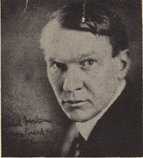Vachel Lindsay (1879-1931)
It was at the colonel's house on Russian Hill that I had my only encounter with that great American poet, Vachel Lindsay, in whose interpretation of religion I always detected something that reminded me of William Blake. I felt very friendly to him and he must have been quick to catch my feelings, for he asked me to go the the sation with him and see him off to Los Angeles. This I felt I ought not to do just then, as it was the colonel's birthday...(John Cowper Powys, Autobiography)
V. The Unpardonable Sin
This is the sin against the Holy Ghost: —
To speak of bloody power as right divine,
And call on God to guard each vile chief's house,
And for such chiefs, turn men to wolves and swine: —
To go forth killing in White Mercy's name,
Making the trenches stink with spattered brains,
Tearing the nerves and arteries apart,
Sowing with flesh the unreaped golden plains.
In any Church's name, to sack fair towns,
And turn each home into a screaming sty,
To make the little children fugitive,
And have their mothers for a quick death cry, —
This is the sin against the Holy Ghost:
This is the sin no purging can atone: —
To send forth rapine in the name of Christ: —
To set the face, and make the heart a stone.
From The Congo (Extract)
 |
|
University of Iowa Libraries |
Vachel Lindsay was born in Springfield, Illinois. He started by studying medicine at Hiram College, but then decided to become an artist. He studied at the Art Institute of Chicago, and later at the New York School of Art. He was to retain his interest for art all his life and used to illustrate some of his poems. Around 1905, he started writing poetry and tried to sell his poems in the streets. After a number of years, "vagabondish wanderings", as Harriet Monroe wrote, travelling on foot like a "troubadour", selling his poems as he walked long distances through the States, he started being recognised as a poet around 1910. His poem The Congo brought him fame. Harriet Monroe published him in Poetry Magazine, linking his name with that of Carl Sandburg and Edgar Lee Masters, two other Illinois poets.
In 1925, he married a young woman, Elizabeth Connor, and started having serious financial problems. Two children were born, Susan in 1926 (who was later to marry John Russell, Bertrand Russell's son) and Nicholas in 1927. Vachel Lindsay in order to earn some money undertook an exhausting tour of readings in 1928 and 1929 in the East and Midwest of the States. Then the family moved back to the house of his birth, in Springfield. After the 1929 Stock Market crash, Vachel Lindsay, crushed by financial pressure, a failing health and clinical depression, committed suicide in 1931.
In 1935 Edgar Lee Masters was to write a biography, Vachel Lindsay, A Poet in America. The Illinois Historic Preservation Agency maintains "The Vachel Lindsay Home" at 603, South 5th Street, Springfield.
His poetry can be strong and powerful, with rythm and jazz influence, but poverty in later years altered its quality. His main works are: General William Booth Enters into Heaven & Other Poems, (1913), The Congo & Other Poems (1914), The Chinese Nightingale (1917), The Daniel Jazz and Other Poems (1920), Collected Poems (1938).
Taken from Harriet Monroe's introduction to The Congo, this explanatory note by Vachel Lindsay himself:
"Mr. Yeats asked me recently in Chicago, `What are we going to do to restore the primitive singing of poetry?' I find what Mr. Yeats means by `the primitive singing of poetry' in Professor Edward Bliss Reed's new volume on `The English Lyric'. He says in his chapter on the definition of the lyric: `With the Greeks "song" was an all-embracing term. It included the crooning of the nurse to the child ... the half-sung chant of the mower or sailor ... the formal ode sung by the poet. In all Greek lyrics, even in the choral odes, music was the handmaid of verse.... The poet himself composed the accompaniment. Euripides was censured because Iophon had assisted him in the musical setting of some of his dramas.' Here is pictured a type of Greek work which survives in American vaudeville, where every line may be two-thirds spoken and one-third sung, the entire rendering, musical and elocutionary, depending upon the improvising power and sure instinct of the performer."
Poems about the Moon (Extract)
1. Euclid
Old Euclid drew a circle
On a sand-beach long ago.
He bounded and enclosed it
With angles thus and so.
His set of solemn greybeards
Nodded and argued much
Of arc and circumference,
Diameter and such.
A silent child stood by them
From morning until noon
Because they drew such charming
Round pictures of the moon.
Vachel Lindsay, Collected Poems
|
|